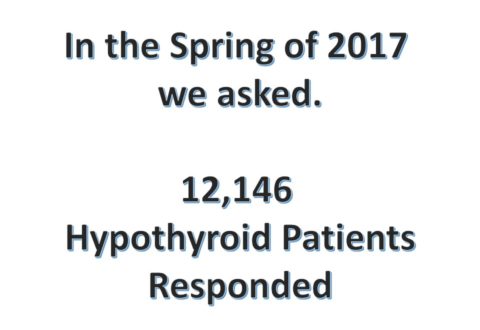Current guidelines recommend daily tablets of levothyroxine at doses that normalize blood levels of TSH to treat hypothyroidism but some patients remain symptomatic despite treatment. These patients may complain of sluggishness, lethargy, sleepiness, memory problems, depression, cold intolerance, hoarseness, dry skin, body weight gain, and constipation; patients may also change physicians multiple times in pursuit of other treatments and better quality of life. To gain further insight and patients’ perspectives on the treatment of hypothyroidism the American Thyroid Association organized an online survey dedicated to hypothyroid patients in the Spring of 2017.
In this survey, hypothyroid patients were asked to rank satisfaction with their treatment using a scale of 1 to 10, with 10 being the maximum. Responses were grouped according to therapy, which was identified as (i) levothyroxine, (ii) levothyroxine (LT4) plus liothyronine (LT3), or desiccated thyroid extract (DTE).
A total of 12,146 individuals participated in the survey and reported an overall satisfaction level of 5.0. Many patients also reported other clinical conditions such as depression, stressors or other illnesses, and were eliminated. Of the remaining 3,670 individuals, those taking DTE reported a treatment satisfaction of 7.0. At the same time, the individuals treated with levothyroxine reported the lowest satisfaction of 5.0. These differences are statistically significant. Individuals taking DTE were also less likely to complain about weight management, fatigue/low energy levels, mood, and memory, as compared to those taking levothyroxine.
In conclusion, a subset of patients with hypothyroidism is not satisfied with their treatment. Among these patients, higher satisfaction was observed in those taking DTE when compared to levothyroxine. Future studies should investigate why DTE is preferred by this subset of dissatisfied patients.
Contributed by Sarah Peterson, PhD
Original studies at: PMID: 29620972
